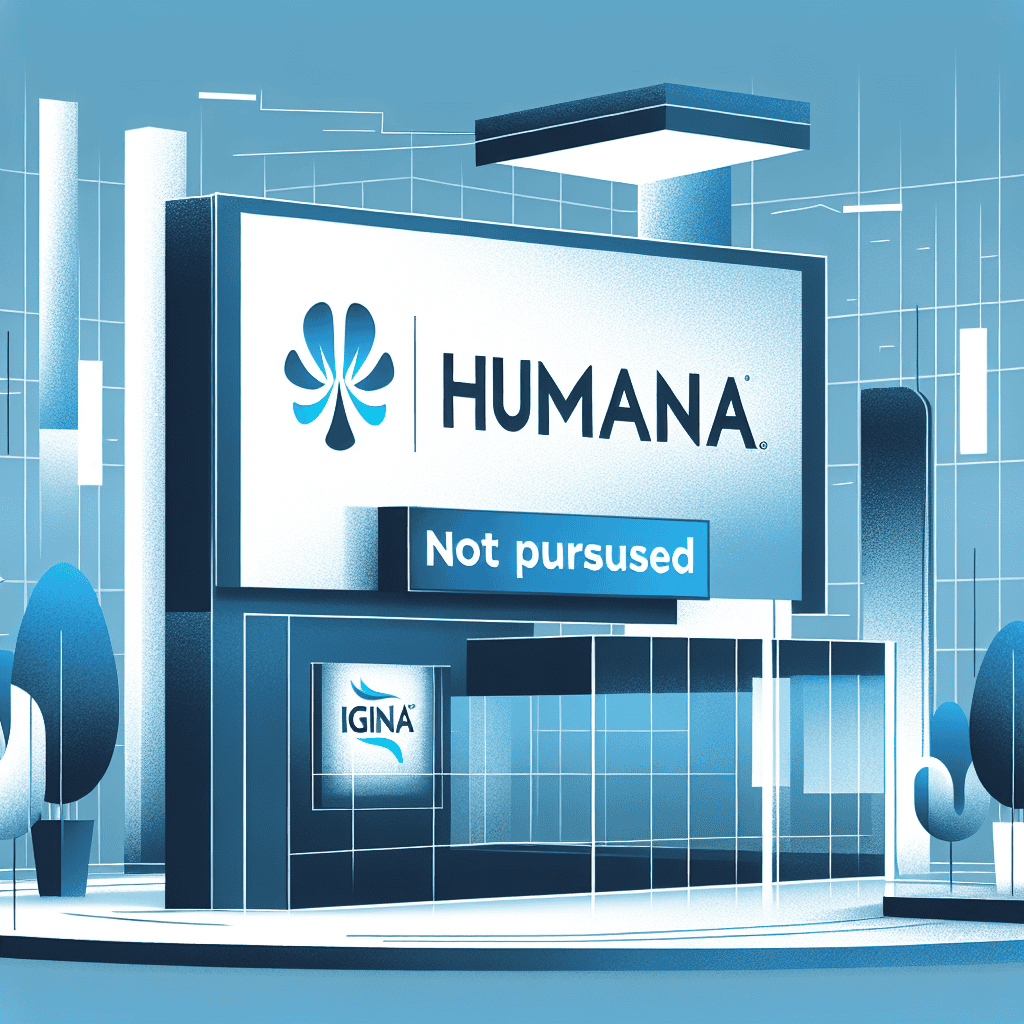Cigna Rules Out Acquisition of Humana: An In-Depth Analysis

The healthcare industry is no stranger to mergers and acquisitions, with companies constantly seeking to expand their reach and capabilities. However, not every potential merger comes to fruition. Recently, Cigna, one of the largest health service companies in the United States, ruled out the acquisition of Humana, another major player in the healthcare sector. This decision has sparked discussions and analyses across the industry. In this article, we will delve into the reasons behind Cigna’s decision, the implications for both companies, and the broader impact on the healthcare market.
1. The Background of Cigna and Humana
To understand the significance of Cigna’s decision, it’s essential to first explore the backgrounds of both companies. Cigna and Humana are giants in the healthcare industry, each with its own strengths and market focus.
Cigna: A Brief Overview
Cigna Corporation, headquartered in Bloomfield, Connecticut, is a global health service company. It offers a wide range of health insurance products and services, including medical, dental, disability, life, and accident insurance. Cigna has a strong presence in the United States and international markets, serving millions of customers worldwide.
- Founded in 1982 through the merger of INA Corporation and Connecticut General Corporation.
- Operates in over 30 countries with approximately 180 million customer relationships.
- Focuses on providing integrated health services and solutions.
Cigna’s strategy has been to enhance its capabilities through strategic partnerships and acquisitions, such as its acquisition of Express Scripts in 2018, which expanded its pharmacy benefits management services.
Humana: A Brief Overview
Humana Inc., based in Louisville, Kentucky, is a leading health and well-being company. It primarily focuses on health insurance services, with a significant emphasis on Medicare Advantage plans. Humana has been a key player in the Medicare market, serving millions of beneficiaries across the United States.
- Founded in 1961 as a nursing home company before transitioning to health insurance.
- One of the largest providers of Medicare Advantage plans in the U.S.
- Committed to innovation in healthcare delivery and value-based care models.
Humana’s growth strategy has involved expanding its Medicare offerings and investing in technology to improve healthcare outcomes and customer experiences.
2. The Rationale Behind Cigna’s Decision
While mergers and acquisitions can offer significant benefits, they also come with challenges and risks. Cigna’s decision to rule out the acquisition of Humana was influenced by several factors, including strategic alignment, financial considerations, and regulatory hurdles.
Strategic Alignment
One of the primary reasons for Cigna’s decision was the lack of strategic alignment between the two companies. While both Cigna and Humana are major players in the healthcare industry, their core business focuses differ significantly.
- Cigna’s focus is on providing a broad range of health services, including pharmacy benefits management, which was bolstered by its acquisition of Express Scripts.
- Humana’s primary focus is on Medicare Advantage plans, which cater to a specific segment of the population.
The divergence in business models and target markets may have posed challenges in achieving synergies and integrating operations effectively. Cigna likely assessed that the potential benefits of the acquisition did not outweigh the complexities involved in merging two distinct business models.
Financial Considerations
Financial considerations also played a crucial role in Cigna’s decision. Acquiring a company of Humana’s size would require a substantial financial commitment, potentially impacting Cigna’s balance sheet and financial flexibility.
- Humana’s market capitalization is significant, and any acquisition would involve a considerable premium over its current market value.
- Cigna would need to evaluate the potential return on investment and whether the acquisition would create long-term shareholder value.
Given the financial implications, Cigna may have determined that pursuing organic growth or smaller, more strategic acquisitions would be a more prudent approach to achieving its business objectives.
Regulatory Hurdles
The healthcare industry is heavily regulated, and any major merger or acquisition is subject to scrutiny by regulatory authorities. Cigna likely considered the potential regulatory challenges associated with acquiring Humana.
- Previous attempts at large-scale mergers in the healthcare sector have faced significant regulatory hurdles, including antitrust concerns.
- The Federal Trade Commission (FTC) and the Department of Justice (DOJ) closely monitor mergers to ensure they do not harm competition or consumer choice.
Cigna may have anticipated that the acquisition of Humana would face intense regulatory scrutiny, potentially delaying or even blocking the deal. This uncertainty could have influenced Cigna’s decision to rule out the acquisition.
3. Implications for Cigna and Humana
The decision to rule out the acquisition has implications for both Cigna and Humana, affecting their strategic directions and market positions.
Implications for Cigna
For Cigna, ruling out the acquisition allows the company to focus on its existing strengths and strategic priorities. By not pursuing the acquisition, Cigna can allocate resources to areas that align with its long-term vision.
- Cigna can continue to build on its integrated health services model, leveraging its pharmacy benefits management capabilities.
- The company can explore partnerships and smaller acquisitions that complement its existing offerings and enhance its competitive position.
Additionally, Cigna can maintain financial flexibility, allowing it to invest in innovation and technology to improve customer experiences and healthcare outcomes.
Implications for Humana
For Humana, the decision not to be acquired by Cigna means the company can continue to pursue its growth strategy independently. Humana can focus on expanding its Medicare Advantage offerings and exploring new opportunities in value-based care.
- Humana can invest in technology and data analytics to enhance its healthcare delivery models and improve patient outcomes.
- The company can explore partnerships and collaborations that align with its mission of providing high-quality, affordable healthcare.
By remaining independent, Humana can maintain its unique identity and continue to innovate in the Medicare space, where it has established a strong market presence.
4. The Broader Impact on the Healthcare Market
The decision by Cigna to rule out the acquisition of Humana has broader implications for the healthcare market, influencing industry dynamics and competitive landscapes.
Industry Dynamics
The healthcare industry is characterized by rapid change and evolving consumer expectations. The decision not to pursue the acquisition reflects the complexities and challenges of large-scale mergers in this sector.
- Companies are increasingly focusing on strategic partnerships and collaborations to achieve growth and innovation.
- The emphasis is on creating value through integrated care models and leveraging technology to improve healthcare delivery.
The decision by Cigna may signal a shift in industry dynamics, with companies prioritizing organic growth and targeted acquisitions over large-scale mergers.
Competitive Landscape
The competitive landscape in the healthcare industry is intense, with companies vying for market share and customer loyalty. The decision not to merge allows both Cigna and Humana to continue competing independently, potentially leading to increased innovation and differentiation.
- Companies may focus on enhancing their unique value propositions to attract and retain customers.
- The emphasis on customer-centric care and personalized health solutions is likely to intensify.
The decision by Cigna may encourage other companies to explore alternative growth strategies, such as partnerships and alliances, to remain competitive in a rapidly changing market.
5. Case Studies and Examples
To further understand the implications of Cigna’s decision, it’s helpful to examine case studies and examples of other mergers and acquisitions in the healthcare industry.
Case Study: Aetna and CVS Health
One notable example is the merger between Aetna and CVS Health, which was completed in 2018. This merger created a new healthcare model that combined insurance services with retail pharmacy operations.
- The merger aimed to create a more integrated healthcare experience for consumers, with a focus on convenience and accessibility.
- By combining resources, Aetna and CVS Health sought to improve care coordination and reduce healthcare costs.
The success of this merger highlights the potential benefits of strategic alignments that enhance consumer experiences and drive value in the healthcare market.
Example: UnitedHealth Group’s Acquisition Strategy
UnitedHealth Group, another major player in the healthcare industry, has pursued a different approach to growth through targeted acquisitions. The company has focused on acquiring companies that complement its existing capabilities and expand its reach.
- UnitedHealth’s acquisition of DaVita Medical Group in 2019 expanded its healthcare delivery network and enhanced its value-based care offerings.
- The company’s acquisition strategy emphasizes creating synergies and improving healthcare outcomes through integrated care models.
UnitedHealth’s approach demonstrates the potential benefits of targeted acquisitions that align with a company’s strategic goals and enhance its competitive position.
Conclusion
The decision by Cigna to rule out the acquisition of Humana reflects the complexities and challenges of large-scale mergers in the healthcare industry. While mergers and acquisitions can offer significant benefits, they also come with risks and uncertainties. Cigna’s decision allows both companies to focus on their unique strengths and strategic priorities, potentially leading to increased innovation and differentiation in the market.
The broader implications for the healthcare industry include a shift towards strategic partnerships and collaborations, as companies seek to create value through integrated care models and technology-driven solutions. As the industry continues to evolve, companies will need to adapt and innovate to meet changing consumer expectations and remain competitive in a rapidly changing market.
Ultimately, the decision by Cigna serves as a reminder of the importance of strategic alignment, financial considerations, and regulatory factors in shaping the future of the healthcare industry. By understanding these dynamics, companies can make informed decisions that drive growth and create value for their customers and stakeholders.





